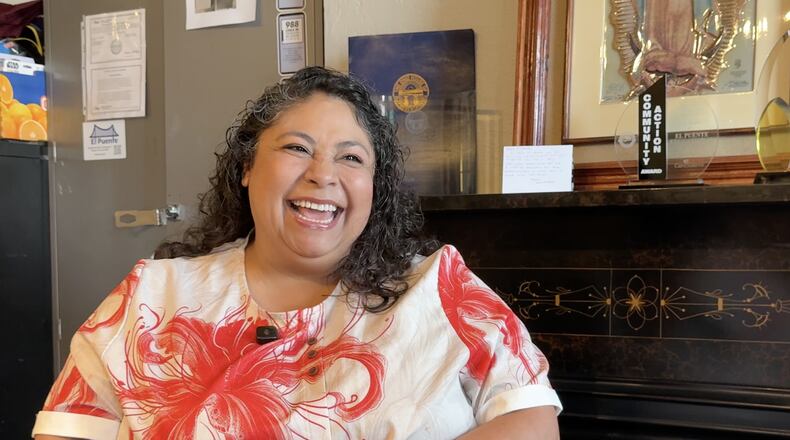Ayala Ramos spoke with Dayton Daily News with the help of her El Puente colleague and close friend, Virginia Rodriguez-Colon, who translated parts of the conversation.
“When they dance, they show movement, with colors and different accessories,” Ayala Ramos said. “We move in harmony, with joy in this city. And we can incorporate and integrate.”
In addition to serving as the community engagement specialist at El Puente in northern Dayton, Ayala Ramos also teaches dance through the Orgullo Mexicano of Dayton club.
“Orgullo” means pride in Spanish. And for the mother and grandmother, dance is a jubilant nod to her heritage.
“This is my passion, my hobby,” she said. “That’s our way of sharing with the community our culture. That we’re here.”
When Ayala Ramos came to America with her husband, she left behind both a job as a nurse specializing in heart surgery and many loved ones.
“It’s true that moving from one place to another creates anxiety,” she said. “But it’s important to remind people that the decision was theirs to move, and they wanted to make a change. And we come to this land to give the best of ourselves.”
She said that during her more than 25 years in America, she has never parted ways with her values and her culture. Rather, those elements have blended with her identity as a Daytonian.
The only person she moved to the United States with in 1999 was her husband, and she felt very reliant on him in the first few years of her time in America.
“At the beginning, I couldn’t drive. I wasn’t able to work. I had to rely totally on my husband. It was a slow process. I like to contribute. I don’t like to stay still,” Ayala Ramos said.
Learning a completely new language was a frustrating undertaking for Ayala Ramos. For the wife and mother of two girls, completing errands was like playing a game of charades — she relied for a while on pointing to objects and making gestures to act out what she needed.
At one point, a store clerk was unkind to Alaya Ramos when she was out shopping with her daughters, and one of her children piped up to defend her mother.
“I didn’t know what was happening, so I just smiled,” she said. “Until I understood. And then I said I need to defend myself.”
Ayala Ramos said her faith in God supplied her with the resilience and patience she needed in her new home. But her independence was renewed when she received her work authorization and earned her driver’s license. Her first job was cleaning houses.
Many immigrants who come to the United States have backgrounds in health care or other industries that they cannot utilize in their new home due to a lack of necessary licensing or certification. Although she misses being a nurse, she fulfills the mission of helping people in other ways.
“Mi casa es su casa” — my home is your home — is not just a saying, but a philosophy for Ayala Ramos and her network at El Puente.
El Puente is an education service center that serves the Spanish-speaking community in the Dayton region, and Ayala Ramos serves as its community engagement specialist.
Moving to a new country can be overwhelming: in Ayala Ramos’ experience, a challenge for many families is navigating how the United States approaches its education system.
For example, the age at which children begin school differs here. School uniforms aren’t the norm in public school education, and enrolling a child in school is dependent on where a family resides.
El Puente holds after-school programs for students, as well as workshops for parents, health clinics and more.
The American education system has a stronger expectation of parent participation than other cultures are used to, she explained.
But she doesn’t accept excuses from parents.
“I work with love, but I’m strict,” Ayala Ramos said. “It’s not about what we can take, but what we can give.”
About the Author



